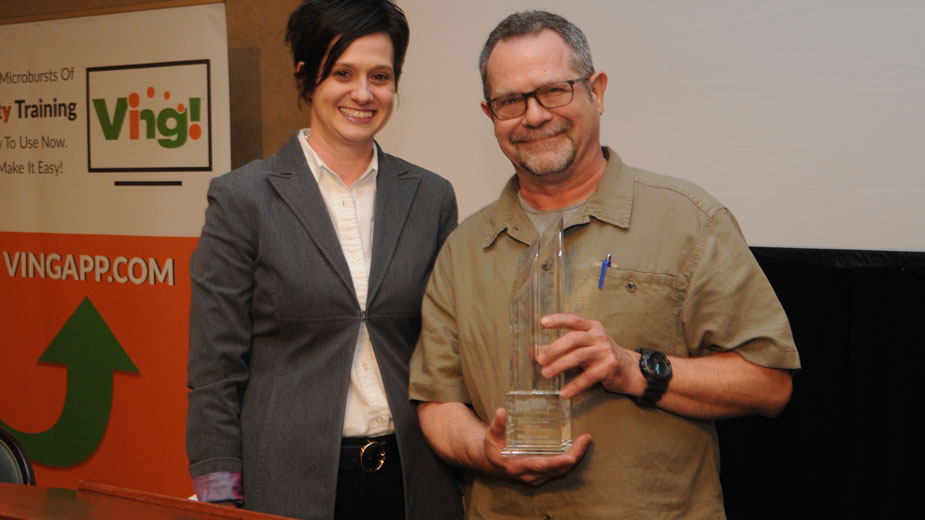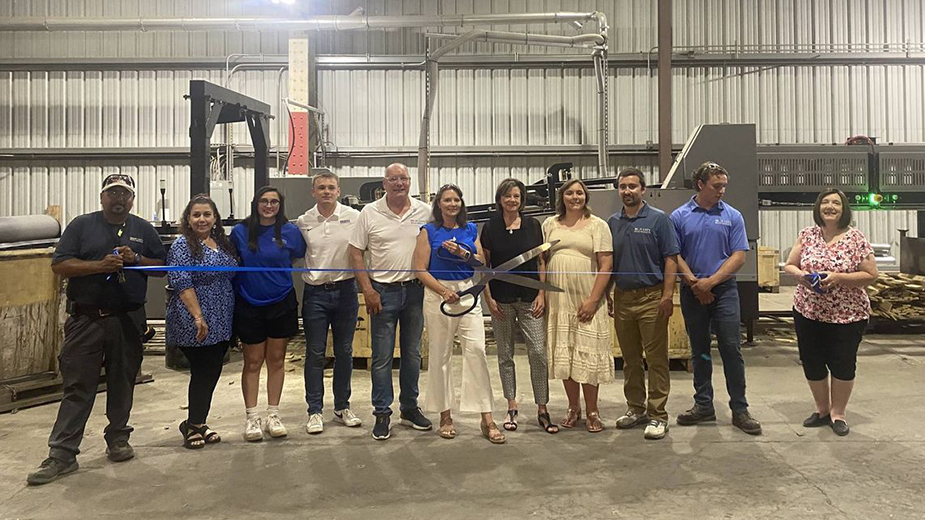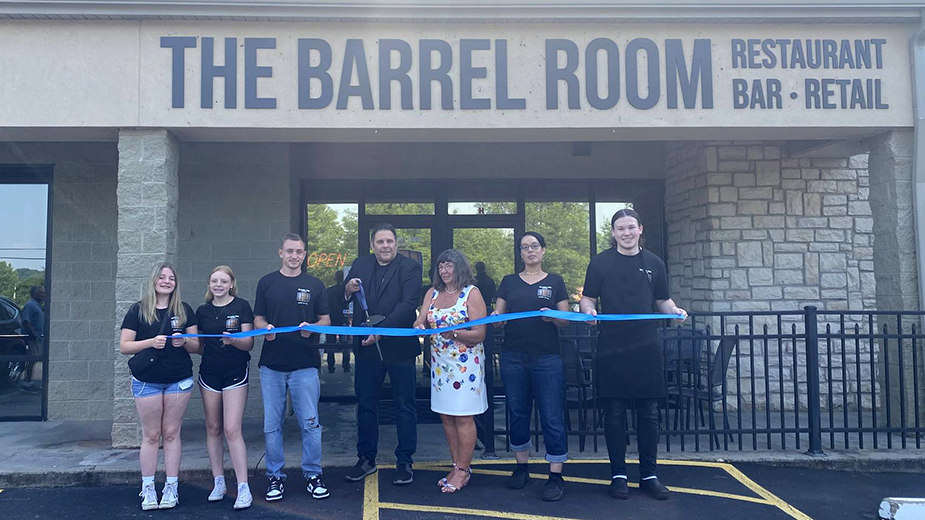Niles Expanded Metals Wins Kovach Safety Award
POLAND, Ohio — Working in the steel industry, Claudia Kovach understands how difficult it can be to cut and handle metals and the safety issues that can arise.
“Those metal chips always have a way of getting into my shoes and my house,” Kovach said. “I just found one in the dryer yesterday.”
Kovach, City Machine Technologies Inc. vice president, addressed some 165 business professionals at the Mahoning Valley Safety Council luncheon at The Embassy banquet center where she presented the 13th annual Joan Kovach Safety Leadership Award to Niles Expanded Metals, one of CMT’s customers. An emotional Kovach introduce the award named in memory of her late mother.
“The 2019 Kovach winner is committed to values centered around a diverse culture and people,” Kovach said. “They develop each employee as their most valued investment while maintaining a work environment that inspires employees to succeed.”
Mark Egley, safety director and continual improvement manager at Niles Expanded Metals, accepted the award on behalf of the company. Since taking over the position a year ago, Egley said many of the safety measures were already in place and his efforts were more about “being a nuisance.”
Egley walks the shop floor ensuring all employees are wearing appropriate personal protective equipment, or PPE, including arm guards, gloves, hearing protection, safety boots and safety glasses, per company policy.
“We work with sharp metal, we cut metal; cuts and sticks are a big thing,” he said. “That went a long way to reducing trips to the hospital, stitches and things like that.”
Some of the metals used at the plant have sharp edges, so the company lined off the floors and identified sections where metal is stored, as well as installed railings where coils are stored, he said. The plant has many walking working surfaces where oil and grease can create hazards, he said, so the company does its best to keep up with it and employs safety measures when it can’t.
“That’s always something that you’re chasing because the presses all run on grease and oil, it drops on the ground, so we try to meter the grease and the amount that we’re using,” he said. “We’ll put stuff like cardboard or oil-dry down to make sure that the surfaces aren’t as slippery as they could be. Right now, it’s just basic things to keep people out of the emergency room.”
The efforts are proving effective, he said. Every six months, the company used to send workers to the hospital six or seven times for injuries and stitches. Now, the company is down to two or three hospital trips annually.
He doesn’t know exactly how much that has saved the company financially, but “I would guess that our workers’ comp premiums have gone down,” he said.
Egley was happy to have the company recognized, but said the work isn’t over.
“It’s been a long time that we would keep moving forward,” he said. “And it’s nice to be recognized. But like I said, it’s not the end; we still have a long way to go.”
Runners up for the Kovach award were Simco Management Corp. and ITPS Inc. In addition to the Kovach award, 88 companies received recognition for their own safety records. Of those businesses, 20 earned the Special award, which goes to companies that accumulate at least 500,000 hours and at least six months without lost time injury. They are Berk Enterprises, Blakeman Valley Office Equipment Inc., Brentwood Originals, City Machine Technologies, Columbiana Foods, Dearing Compressor and Pump, Home Savings and Loan Co., Howland Local Schools, Iron and String Life Enhancement Inc., Leeda Northeast Inc., Magna Seating, Mill Creek MetroParks, MS Consultants Inc., New Leaf Residential Services Inc., 717 Credit Union, Things Remembered, TTM Technologies Inc., United Steel Service and Wheatland Tube Co.
The keynote speaker for the event was Ruth Bowdish, corporate training manager with On Demand Drug Testing and Workplace Solutions, Austintown. Bowdish presented on the impact of drug abuse in the workplace, and she said she wants people to understand that it stems from the drug culture in the United States that “has changed significantly” over the last five to 10 years.
“There was a time when we would hear the word ‘overdose’ and we would be shocked,” she said. “Now, we just change the channel.”
Drug and alcohol abuse should be one of the forefronts of company safety programs because of the opiate epidemic as well as the legalization of medical marijuana in Ohio. The topic is relevant to business owners, who she said are having trouble finding employees who can pass a drug test.
Regarding an employee who tests positive for marijuana, one of the biggest questions she gets from business owners is how to tell the difference between legal medicinal marijuana and illegal marijuana. In Ohio, “there is no difference,” she said.
“Medical review officers will not verify drug tests as negative based upon information that a physician recommended they use medical marijuana,” she said. “If it’s banned in a company policy, it’s banned.”
While opiates and marijuana don’t affect the body in the same way, “it’s the mentality that we’re talking about” regarding drug culture, she said. The mentality of “there’s a pill for everything” coupled with the recent legalization of medicinal marijuana, which is still recognized as a Schedule 1 drug.
“And now we’re saying it’s fine, it’s for medicine,” she said. “And because we have become so apathetic to drug use overall, we’re allowing this to usher in without actually having a lot of the scientific facts behind marijuana.”
While marijuana can be medicinal in many cases, she said, its psychotropic properties affect the user’s brain. It’s an important thing for businesses to note for safety issues, she said. Marijuana affects multiple parts of the brain both short and long term, she said. Some of the effects include an inability or difficulty in recalling information, which can impact a habitual user’s ability to recall details about lockout, tagout or using PPE, she said. It can also impair coordination, motor dexterity and reaction times.
“Those are three critical components to any safety plan in a business,” she said.
Bowdish told those gathered about her own experience when an accident at work sent her husband, who works in construction, to the hospital. A coworker who had smoked marijuana before coming to work didn’t properly abide by safety protocol.
Her husband survived, but the event is a stark reminder of the statistics. Drug use, alcohol and substance use on the job accounts for more than 35% of workplace injuries and fatalities, Bowdish said.
“I don’t think that statistic is acceptable,” she said. “I don’t want anyone to have to get a phone call like I got one day.”
Financially, drug use costs companies in the United States about $81 billion, which is driven by higher absentee rates, lower productivity and higher insurance rates, Bowdish said.
Bowdish recommends that businesses get their drug policies up to date regarding medicinal marijuana as well as expanded opiates, and to ensure employees are trained in and understand exactly what is happening in the world and are following the company’s drug-free policy.
“Having a drug-free policy is a huge deterrent,” she said. “And by enforcing that policy, understanding reasonable suspicion, we’re able to make drug-free workplaces and hopefully start to eliminate, or at least decrease, the amount of positive [drug tests].”
She also recommends adding a one-chance policy to help an employee who tests positive to get the help they need, whether through an employee assistance program or a substance abuse program for treatment.
“That’s huge,” she said. “Each person is over $3,000 a year that’s going to save a company by doing that.”
CLICK HERE for Bowdish’s 3 Minutes With interview.
Pictured: Claudia Kovach, City Machine Technologies Inc. vice president, and Mark Egley, safety director and continual improvement manager at Niles Expanded Metals, who accepted the Joan Kovach Safety Leadership Award on behalf of the company.
Copyright 2024 The Business Journal, Youngstown, Ohio.



